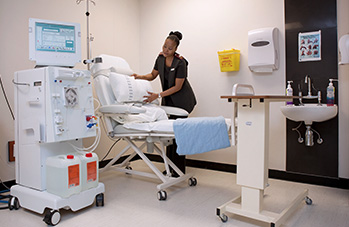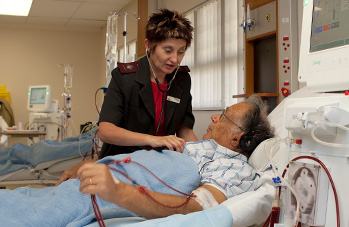About Life Renal Dialysis
We provide specialised renal care services through acknowledging the complex needs of patients living with chronic kidney disease. We are committed to transforming renal care to ensure improved patient experience and outcomes. Our renal integrated care programme (ICP) prioritises the patient, offering a multidisciplinary approach tailored to individual needs, ensuring a personalised and effective renal care experience. This ICP is being rolled out in a phased approach across all Life Renal Dialysis units and is available at 27 units currently.
An important aspect of the continuum of care includes patient education. This provides valuable insights for patients into managing their kidney health. Our programme’s educational resources assist in empowering patients with knowledge and practical tips for a better quality of life. The programme also includes quality of life assessments where patients complete periodic health-related surveys. One of the very successful aspects of the integrated approach is the inclusion of care co-ordinators (available at the units offering the ICP) who provide guidance and ensure patients get all the support they need, from both a clinical and emotional support perspective.
The care co-ordinator relationship is based on an understanding that patients living with chronic kidney disease require more than just dialysis treatment. Our co-ordinators create a collective understanding between the patient and the teams of clinicians involved in their care. For a list of the units offering the ICP click here.
More on Renal Dialysis
Your kidneys have the important job of filtering the blood to remove toxins, excess water and waste material. When they are unable to carry out this duty, a machine is used to help them perform their functions through renal dialysis. This treatment ensures that there’s proper balance of the fluids and electrolytes in your body, even when your kidneys aren’t functioning well.
How does renal dialysis work?
- Blood travels through dialysis blood lines to the dialyser, also known as the artificial kidney.
- The dialyser is made up of two compartments: one through which blood passes, and another containing dialysate.
- Porous membranes inside the dialyser allow for the movement of waste products, electrolytes and water between compartments through a process of osmosis and diffusion.
- These exchanges continue over the prescribed dialysis session until a balance of electrolytes and effective waste removal are achieved.
Which renal dialysis services do we offer?
Life Renal Dialysis is a specialised healthcare service providing acute and chronic renal dialysis services. Our services help patients in renal failure who require:
- Outpatient-based chronic renal dialysis
- Home-based peritoneal dialysis
Cleansing fluid is surgically inserted into your belly to help filter fluids in your kidneys if you’ve had renal failure. - Acute renal dialysis in hospital
This is administered in hospital.
Our facilities offer the latest renal dialysis technology, including renal dialysis machines and comfortable dialysis chairs. Ease of access is ensured to hospital specialists, physicians, X-ray departments and laboratory facilities.
How can you access renal dialysis treatments?
- Self-referral, where you may choose which hospital to visit for your treatment
- Referral from a specialist or general practitioner to the nephrologist (doctor who specialises in kidney disease)
- Referral directly from the treating nephrologist
- Direct contact with the unit manager at the renal dialysis unit
- Referral as determined through your medical scheme’s preferred provider network
There are three ways to sign off your dialysis treatment:
- Referral from a referring specialist or general practitioner to the nephrologist
- Referral directly from the treating nephrologist
- Direct contact with the unit manager at the renal dialysis unit
What is the time and duration of renal dialysis?
The frequency of your treatments and duration of each session will depend on your kidney function and renal dialysis unit.
The most common renal dialysis treatment programme to achieve adequate clearance is a four-hour session, two to three times a week. You will be required to select one slot that comprises two to three sessions per week.
For example morning (am) sessions may run as follows:
- Slot 1: 6am–10am on Mondays, Wednesdays and Fridays
- Slot 2: 6am–10am on Tuesdays, Thursdays and Saturdays
For example afternoon (pm) sessions may run as follows:
- Slot 3: 11am–2pm on Mondays, Wednesdays and Fridays
- Slot 4: 11am–2pm on Tuesdays, Thursdays and Saturdays
Evening nocturnal dialysis at selected units
For your convenience, selected facilities provide evening sessions. This will have to be discussed with the facility unit manager and will depend on the availability of evening slots.
How to choose the right renal dialysis treatment
Preparing for your renal dialysis treatment
You will need a separate authorisation number for dialysis treatment; a hospital authorisation number will only cover your hospital stay and not your dialysis treatments.
Our Life Healthcare case managers will assist you with the following process:
- obtaining relevant medical aid forms
- ensuring that your treating specialist completes the necessary forms
- returning the forms and your latest blood-test results to your medical aid
- obtaining an additional motivation from your nephrologist in the case of some specialised procedures such as continuous renal replacement therapy (CRRT)
How does the funding and payments for renal dialysis work?
- Any costs not covered by a medical scheme will have to be settled by the patient receiving treatment.
- If you are unsure of any financial matter, please speak to one of our case managers at the hospital where you are receiving treatment.
- Patients who are not covered by a medical scheme will be required to pay a cash payment based on the estimated total costs of treatments delivered.
- Please note that services provided by other medical and healthcare professionals are not included on the account for dialysis treatments and will be charged separately.




